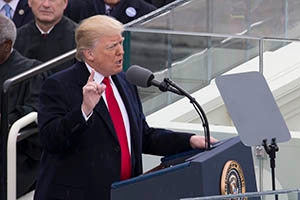On Campus
Serving in the Trump Administration: Exit, Voice and Loyalty

U.S. presidential transitions are a time of uncertainty for government employees as priorities and policies shift. Yet, the election of Donald Trump, who pledged to "drain the swamp" in Washington, spurred a new level of anxiety in some.
Experienced scholars and practitioners at the Public Management Research Conference, held June 8-10 at American University School of Public Affairs, discussed how federal employees were adjusting and reacting to serving in the Trump Administration. Despite headlines predicting major upheaval, the experts reassured the audience the bureaucracy was slow to change and the protections are in place to keep needed services going.
"Every career civil servant takes an oath of office pledging loyalty to constitution - not to the president - and they take that oath seriously," said one of the long-time public administration panelists. "What they do is for the betterment of the country. When they are given orders that are unethical or in opposition to the best interest of the U.S., they will sit back and engage in guerilla government."
One scholar spoke about guerilla government - public servants who act against the wishes of their superiors. Some in the new administration are expressing dissent and demonstrating a resistance from within. They might obey administration orders in public, but disobey in private. This might mean leaking information to the media, working with interest groups to leverage influence, stalling the enforcement of policies, holding clandestine meetings to plot strategies for working with administration appointees or filing complaints with investigative offices.
"Guerilla government happens all the time - but I think it is happening a lot more in Trump administration," said a panelist and public management scholar. "It is a manifestation of inevitable tension in a democracy and bureaucracy that will never go away. It will ebb and flow - and it's really at a top level now."
Another scholar said that the Trump Administration wants to disrupt the regulatory state and it can influence policy in the way it chooses to implement regulations. The new approach to dismantling the administrative state is affecting policies and norms regarding homeland security, immigration and other areas. President Trump has also appointed leaders to agencies that have been outspoken against agency missions. "This has consequences on employee morale and budgetary battles."
One of the scholars during the roundtable called for more research on political appointments and a closer look at the impact of federal spending. They also encouraged researchers to make themselves available to media to speak about the practical implications of their research.
"This is best of times and worst of time for public management and public administration," said one panelist scholar. "We've never had a better opportunity to demonstrate our relevance to the world."
Those speakers who had been through several transitions, emphasized the need for public servants to look at the big picture. This transition doesn't feel much different to previous administrations, said one panelist who urged federal employees to put their ego as a practitioner on the back burner when making decisions. "Our job is to steer, guide and mentor public servants who get wrapped up in the excitement of an event and say: 'Stand back. Take the long view.'"
"Every presidential election usually ends up with one political party replacing another," said another panelist. "Yet, with 2.6 million federal employees and a $4.1 trillion budget, it's hard to move an organization like that. It survives shocks all the time - about every four years, in fact."
The election of President Trump, who is largely unfamiliar with government processes, put the transition behind from the beginning. The administration has been slow with appointments, further limiting its influence. Trump's unfamiliarity with running government is also hampering his team's ability to exert the change pledged in the campaign.
"You cannot change the culture and direction of an agency by yourself, you need wiliness of bureaucracy to come with you," said a scholar panelist. "It will be hard to make substantive changes in the short and long term."
